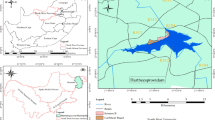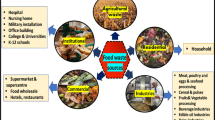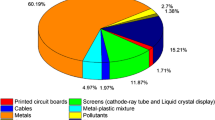Abstract
Botswana is among those developing countries that are rapidly transitioning from predominantly rural to urban societies. Gaborone, its capital city, is seriously confronted by formidable challenges of sustainable metropolitan management, including the proper handling of solid domestic waste. Although the international convention of the 3-Rs, namely, Recycle, Reduce, Reuse is generally accepted; its implementation remains elusive. It is therefore of utmost importance to unravel significant determinants of the gap between nominal acceptance and praxis in order to influence policy. This preliminary case study, consequently, sought to identify the underlying factors that differentiate waste recycling practices from high, medium, and low socio-economic areas Gaborone. Key informants, including municipal officials and company representatives, in charge of city solid waste management, were interviewed. A probit model was used to analyze those factors that could influence recycling and waste separation practices. Results showed that tenure, gender, income, affluence, location of house increase the likelihood of recycling while age, education level, household size and source of waste management information did not influence the likelihood of recycling. Stakeholders should place greater emphasis on positive environmental awareness, and appropriate reward systems for recycling domestic solid waste and recycling should be tailored according to the locational needs.

Source: Statistics Botswana 2011

Source: Gaborone City Council Health Department (2014)

Source: Mupara (2015)

Source: Gwebu (2003)

Source: Gaborone City Council

Source: Gaborone City Council

Source: Mupara (2015)

Source: Collect-A-Can

Source: Mupara (2015)
Similar content being viewed by others
References
Achankeng, E. (2003). Globalization, urbanization and municipal solid waste management in Africa. In Proceedings of the African Studies Association of Australasia and the Pacific 26th annual conference.
Adeyemi, A. S., et al. (2001). Waste scavenging in Third World cities: A case study in Ilorin, Nigeria. The Environmentalist, 21(2), 93–96.
Afroz, R., et al. (2010). Factors affecting waste generation: A study in a waste management programme in Dhaka City, Bangladesh. Environmental Monitoring Assessment, 179(1), 509–519.
Al-Fares, R. A., Al-Jarallah, R. S., & Abdulsalam, Z. (2009). Preliminary investigation of AlJahra waste disposal site using electrical resistivity (ER) surveys. In 2nd Kuwait waste management conference & exhibition, Kuwait City.
Amechi, E. P. (2010). Linking environmental protection and poverty reduction in Africa: An analysis of the regional legal responses to environmental protection. Law Environmental Development Journal, 6, 112–129.
Barr, S., et al. (2005). Defining the multi-dimensional aspects of household waste management: A study of reported behaviour in Devon. Resources, Conservation and Recycling, 45(2), 177–192.
Bartone, C. (1988). The value in wastes. Decade Watch (September Issue), 3–4.
Bjerkli, C. L. (2005). The cycle of plastic waste: An analysis of the informal plastic recovery system in Addis Ababa, Ethiopia. Master’s Thesis, Department of Geography, Norwegian Institute of Science and Technology.
Bolaane, B. (2006). Constraints to promoting people centred approaches in recycling. Habitat International, 30(4), 731–740.
Chikarmane, P. (2012). Integrating waste pickers into municipal solid waste management in Pune, India. Cambridge, MA: Weigo Policy Brief No. 8.
Chu, P., & Chiu, J. (2003). Factors influencing household waste recycling behaviour: Test of an integrated model. Journal of Applied Social Psychology, 33(3), 604–626.
Cohen, B. (2006). Urbanization in developing countries: Current trends, future projections, and key challenges for sustainability. Technology in Society, 28(1), 63–80.
De Kock, R. E. (1986). Garbage picking as a strategy for survival: A case study of a subsector of the informal sector. Durban: Development Studies Unit, University of Natal.
Department of Town and Regional Planning. (2013). Gaborone master plan. DTRP: Gaborone.
Ezeah, C., & Roberts, C. L. (2012). Analysis of barriers and success factors affecting the adoption of sustainable management of municipal solid waste in Nigeria. Journal of Environmental Management, 103, 9–14.
Fiksel, J. (2009). Design for environment: A guide to sustainable product development. New York, NY: McGraw-Hill.
Gaborone City Council Health Department. (2014). Domestic solid waste generated 2010–2013. Gaborone: GCC.
Grazhdani, D. (2016). Assessing the variable affecting the rate of solid waste generation and recycling: An empirical analysis in Prespa Park. Waste Management, 48, 3–13.
Guerrero, L. A., et al. (2013). Solid waste management challenges for cities in developing countries. Waste Management, 33(1), 220–232.
Gujarati, D. N. (2013). Basic econometrics. Boston: McGraw-Hill.
Gwebu, T. D. (2003). Population, development, and waste management in Botswana: Conceptual and policy implications for climate change. Environmental Management, 31(3), 348–354.
Hage, O., et al. (2008). Norms and economic motivation in household recycling: Evidence from Sweden. Resource Conservation and Recycling, 53(3), 155–165.
Hartmann, C. (2012). Uneven urban spaces: Accessing trash in Managua, Nicaragua. Journal of Latin American Geography, 11(1), 143–163.
Heider, I., et al. (2010). Socio-demographic determinants of household solid waste generation in Rawalpindi. Toronto: Ted Rogers School of Management, Ryerson University; McGill.
Heynen, N. (2003). The scalar production of injustice within the urban forest. Antipode, 35(5), 980–998.
Hines, J. M., et al. (1987). Analysis and synthesis of research on responsible environmental behaviour: A meta-analysis. Journal of Environmental Education, 18(2), 1–8.
Kassim, S. M., & Ali, M. (2006). Solid waste collection by private sector: Households’ perspectives-findings from a study in Dar-es-Salaam city, Tanzania. Habitat International, 30(4), 706–780.
Kgathi, D. L., & Bolaane, B. (2001). Instruments for sustainable waste management in Botswana. Waste Management Research, 19(4), 342–353.
Khitoliya, R. K. (2004). Environmental pollution: Management and control for sustainable development. New Delhi, Ram Nagar: S. Chand Company.
Klundert, A. (1999). Integrated sustainable waste management: The selection of appropriate technologies and the design of sustainable systems is not (only) a technical issue. Paper prepared for the CEDARE/IETC inter-regional workshop on technologies for sustainable waste management, held 13–15 July 1999 in Alexandria.
Lee, S., & Paik, H. S. (2011). Korean household waste management and recycling behavior. Building and Environment, 46(5), 1159–1166.
Martin, D., et al. (2006). Social, cultural and structural influences on household waste recycling: A case study. Resource, Conservation and Recycling, 48(4), 357–395.
Masocha, M. (2006). Informal waste harvesting in Victoria Falls town, Zimbabwe: Socio-economic benefits. Habitat International, 30(4), 838–848.
McLennan, A. (2012). The promise, the practice and the politics: Improving service delivery in South Africa. http://www.capam.org/_documents/adjudicatedpresent.mcclennan.pdf. Date consulted 22 Aug 2014.
Medina, M. (1997). Informal recycling and collection of solid wastes in developing countries: Issues and opportunities. UNU/IAS working paper no. 24.
Miafodzyeva, S., et al. (2013). Recycling behaviours of householders living in multicultural urban area: A case study of Jarva, Stockholm, Sweden. Waste Management and Research, 31(5), 447–457.
Miraftab, F. (2004). Neoliberalism and casualization of public sector services: The case of waste collection services in Cape Town, South Africa. International Journal of Urban and Regional Research, 28(4), 874–892.
Momoh, J. J., & Oladebeye, D. H. (2010). Assessment of awareness, attitude and willingness of people to participate in household solid waste recycling programme in Ade-Ekit, Nigeria. Journal of Applied Science I Environmental Sanitation, 5(1), 93–105.
Moore, S. A. (2011). Global garbage: Waste, trash trading, and local garbage politics. In R. Peet, P. Robbins, & M. Watts (Eds.), Global political ecology (pp. 133–144). Abingdon: Routledge.
Mosha, A. C. (2000). Urban planning in Tanzania at the cross roads. Review of Rural and Urban Planning in Southern and Eastern Africa, 1, 79–91.
Mosler, H. J., Drescherb, S., Zurbrugg, C., Rodríguezc, T. C., & Miranda, O. M. (2006). Formulating waste management strategies based on waste management practices of households in Santiago de Cuba, Cuba. Habitat International, 30(4), 849–862.
Mupara, S. W. (2015). An integrated waste management approach as an alternative domestic solid waste management strategy for growing African urban environments: A case study of Gaborone Botswana. Thesis for MSc degree in environmental science, Gaborone, University of Botswana.
Mwanzia, P. (2005). The Salvagers’ way of life and their livelihoods: Nakuru designated dumpsite—Kenya. Baseline report. Unpublished report: Practical Action.
Myres, G. A. (2006). The unauthorized city: Late Colonial Lusaka and post-colonial Geography. Singapore Journal of Tropical Geography, 27(3), 289–305.
Nchito, W., & Myers, G. (2004). Four caveats for participatory solid waste management in Lusaka, Zambia. Urban Forum, 15(2), 109–133.
Owusu, V., et al. (2013). Do income incentives affect attitude to solid waste source separation? Evidence from Ghana. Resource, Conservation and Recycling, 78, 115–123.
Oyekale, S. A. (2015). Factors explaining households cash payment for solid waste disposal and recycling behavior in South Africa. Potchefstroom: Department of Agriculture Economics and Extension, North West University.
Perrin, D., & Barton, J. (2001). Issues associated with transforming households’ attitudes and opinions into materials recovery, a review of two Kerbside recycling schemes. Resource Conservation and Recycling, 33(1), 61–74.
Post, J., & Mwangi, S. I. (2009). Constraints on neighborhood activism: Experiences with services upgrading in Nakuru, Kenya. Urban Studies, 46(3), 665–686.
Robbins, P. (2004). Political ecology: A critical introduction. Oxford: Blackwell.
Rotich, H. K., Yongsheng, Z., & Jun, D. (2006). Municipal solid waste management challenges in developing countries: Kenyan case study. Waste Management, 26(1), 92–100.
Saungweme, M. (2012). An integrated waste management approach as an alternative solid waste management strategy for Mbare Township, Zimbabwe. Masters in Developmental Studies, Thesis, University of the Free State, Bloemfontein, SA.
Seale, C. (2004). Researching society and culture (2nd ed.). London: SAGE.
Segnestam, L. (2002). Indicators of environmental sustainable development. Washington, DC: World Bank.
Silitshena, R. M. K. (1989). Urban environmental management and issues in Africa south of the Sahara. Paper presented at the RUPSEA conference on urban management in Southern and Eastern Africa, Lilongwe, 7–10 October.
Swyngedouw, E., & Kaika, M. (2000). The environment of the city… or the urbanisation of nature. In G. Bridge & S. Watson (Eds.), Companion to urban studies. Oxford: Blackwell.
Tevera, D. S. (1994). Dump scavenging in Gaborone, Botswana: Anachronism or refuge occupation of the poor? Geografiska Annaler. Series B, Human Geography, 76, 21–32.
Tonglet, M., et al. (2004). Using the theory of planned behavior to investigate the determinants of recycling behavior: A case study from Brixton, UK. Resource, Conservation and Recycling, 41(3), 191–214.
Tsiboe, I. A., & Marbell, E. (2004). A look at urban waste disposal problems in Accra. Denmark: Roskilde University.
Tucker, P. (1999). Normative influences in household waste recycling. Journal of Environmental Planning and Management, 42(1), 63–82.
Urio, A. F., & Brent, A. C. (2006). Solid waste management strategy in Botswana: The reduction of construction waste. Journal of the South African Institution of Civil Engineering, 48(2), 18–22.
Vicente, P., & Reis, E. (2008). Factors influencing households’ participation in recycling. Waste Management and Research, 26(2), 140–146.
Weiser, E. L. (2006). Reduction of garbage in the diet of nonbreeding glaucos gulls corresponding to achange in waste management. Arctic, 64, 220–226.
Wooldridge, J. M. (2010). Econometric analysis of cross section and panel data. Cambridge: MIT Press.
Yamane, T. (1967). Statistics: An introductory analysis. New York: Harper and Row.
Yelda, S. (2005). Modified landfill design for sustainable waste management. International Journal on Global Energy Issues, 23(1), 93–105.
Zerbock, O. (2003). Urban solid waste management: Waste reduction in developing nations. School of Forest Resources & Environmental Science. Master’s International Program. Michigan Technological University.
Author information
Authors and Affiliations
Corresponding author
Rights and permissions
About this article
Cite this article
Mupara, S.W., Nkuba, M.R. & Gwebu, T.D. Intra-urban patterns of domestic solid waste recycling in sub-Saharan Africa: towards an exploratory search for insights in Gaborone, Botswana. GeoJournal 83, 967–982 (2018). https://doi.org/10.1007/s10708-017-9811-x
Published:
Issue Date:
DOI: https://doi.org/10.1007/s10708-017-9811-x




